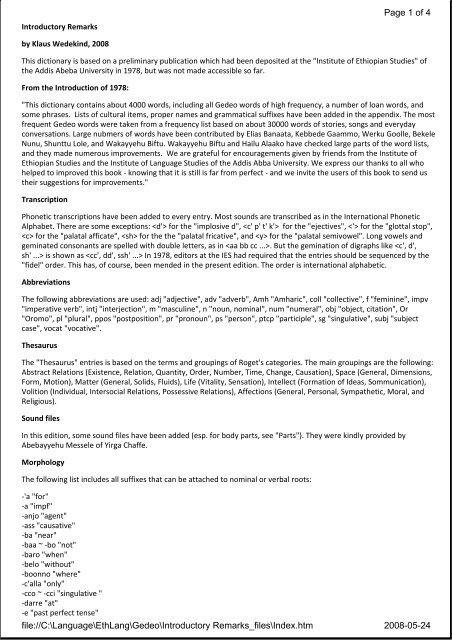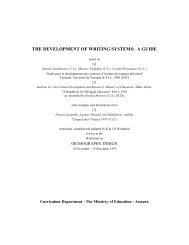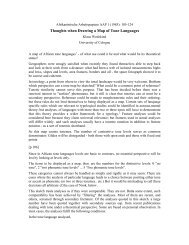2008 Gedeo Dictionary of 1978, Introduction and ... - Klaus Wedekind
2008 Gedeo Dictionary of 1978, Introduction and ... - Klaus Wedekind
2008 Gedeo Dictionary of 1978, Introduction and ... - Klaus Wedekind
You also want an ePaper? Increase the reach of your titles
YUMPU automatically turns print PDFs into web optimized ePapers that Google loves.
Page 1 <strong>of</strong> 4<br />
Introductory Remarks<br />
by <strong>Klaus</strong> <strong>Wedekind</strong>, <strong>2008</strong><br />
This dictionary is based on a preliminary publication which had been deposited at the "Institute <strong>of</strong> Ethiopian Studies" <strong>of</strong><br />
the Addis Abeba University in <strong>1978</strong>, but was not made accessible so far.<br />
From the <strong>Introduction</strong> <strong>of</strong> <strong>1978</strong>:<br />
"This dictionary contains about 4000 words, including all <strong>Gedeo</strong> words <strong>of</strong> high frequency, a number <strong>of</strong> loan words, <strong>and</strong><br />
some phrases. Lists <strong>of</strong> cultural items, proper names <strong>and</strong> grammatical suffixes have been added in the appendix. The most<br />
frequent <strong>Gedeo</strong> words were taken from a frequency list based on about 30000 words <strong>of</strong> stories, songs <strong>and</strong> everyday<br />
conversations. Large nubmers <strong>of</strong> words have been contributed by Elias Banaata, Kebbede Gaammo, Werku Goolle, Bekele<br />
Nunu, Shunttu Lole, <strong>and</strong> Wakayyehu Biftu. Wakayyehu Biftu <strong>and</strong> Hailu Alaako have checked large parts <strong>of</strong> the word lists,<br />
<strong>and</strong> they made numerous improvements. We are grateful for encouragements given by friends from the Institute <strong>of</strong><br />
Ethiopian Studies <strong>and</strong> the Institute <strong>of</strong> Language Studies <strong>of</strong> the Addis Abba University. We express our thanks to all who<br />
helped to improved this book ‐ knowing that it is still is far from perfect ‐ <strong>and</strong> we invite the users <strong>of</strong> this book to send us<br />
their suggestions for improvements."<br />
Transcription<br />
Phonetic transcriptions have been added to every entry. Most sounds are transcribed as in the International Phonetic<br />
Alphabet. There are some exceptions: for the "glottal stop",<br />
for the "palatal afficate", for the the "palatal fricative", <strong>and</strong> for the "palatal semivowel". Long vowels <strong>and</strong><br />
geminated consonants are spelled with double letters, as in . But the gemination <strong>of</strong> digraphs like In <strong>1978</strong>, editors at the IES had required that the entries should be sequenced by the<br />
"fidel" order. This has, <strong>of</strong> course, been mended in the present edition. The order is international alphabetic.<br />
Abbreviations<br />
The following abbreviations are used: adj "adjective", adv "adverb", Amh "Amharic", coll "collective", f "feminine", impv<br />
"imperative verb", intj "interjection", m "masculine", n "noun, nominal", num "numeral", obj "object, citation", Or<br />
"Oromo", pl "plural", ppos "postposition", pr "pronoun", ps "person", ptcp "participle", sg "singulative", subj "subject<br />
case", vocat "vocative".<br />
Thesaurus<br />
The "Thesaurus" entries is based on the terms <strong>and</strong> groupings <strong>of</strong> Roget's categories. The main groupings are the following:<br />
Abstract Relations (Existence, Relation, Quantity, Order, Number, Time, Change, Causation), Space (General, Dimensions,<br />
Form, Motion), Matter (General, Solids, Fluids), Life (Vitality, Sensation), Intellect (Formation <strong>of</strong> Ideas, Sommunication),<br />
Volition (Individual, Intersocial Relations, Possessive Relations), Affections (General, Personal, Sympathetic, Moral, <strong>and</strong><br />
Religious).<br />
Sound files<br />
In this edition, some sound files have been added (esp. for body parts, see "Parts"). They were kindly provided by<br />
Abebayyehu Messele <strong>of</strong> Yirga Chaffe.<br />
Morphology<br />
The following list includes all suffixes that can be attached to nominal or verbal roots:<br />
‐'a "for"<br />
‐a "impf"<br />
‐anjo "agent"<br />
‐ass "causative"<br />
‐ba "near"<br />
‐baa ~ ‐bo "not"<br />
‐baro "when"<br />
‐belo "without"<br />
‐boonno "where"<br />
‐c'alla "only"<br />
‐cco ~ ‐cci "singulative "<br />
‐darre "at"<br />
‐e "past perfect tense"<br />
file://C:\Language\EthLang\<strong>Gedeo</strong>\Introductory Remarks_files\Index.htm<br />
<strong>2008</strong>-05-24
‐ed' "reflexive, autobenefactive"<br />
‐ee'e "because"<br />
‐eessa "agent, m"<br />
‐eesso "rank"<br />
‐eette "agent, f"<br />
‐em "passive"<br />
‐fa'i "if, but if"<br />
‐ffa ~ ‐ssha "like"<br />
‐gop'a "fail to"<br />
‐i "subj. case, adv"<br />
‐in "pers. pl subj"<br />
‐is "causative"<br />
‐it "fem. or 2nd ps"<br />
‐iyy "mean, say, do"<br />
‐iyyo "nominalization"<br />
‐ke ~ ‐ke ~ ‐ki "m identification"<br />
‐k'ic'o "till"<br />
‐k'ic'o'ni "till"<br />
‐la'i "simply"<br />
‐le "if, when"<br />
‐le "times"<br />
‐mma kinni "yes but"<br />
‐mo ... ‐mo "either or"<br />
‐na'a "what about"<br />
‐naa'ni "from"<br />
‐'ni "from at"<br />
‐nna ... ‐nna "both <strong>and</strong>"<br />
‐nna ~ ‐nne ~ ‐nno "1st ps"<br />
‐nni "together with"<br />
‐o "conditional aspect"<br />
‐oole "agents, pl"<br />
‐oota "agents, pl"<br />
‐ra "plural"<br />
‐ssha ~ ‐ffa "like"<br />
‐ta'a "what about"<br />
‐te ~ ‐ti ~ ‐ta "f identity"<br />
‐tt'a ~ ‐tt'e "f. ident."<br />
‐tta ‐tte ‐tto "2nd ps sg"<br />
‐tt'i "then, same subj"<br />
‐u "hypothetic aspect"<br />
‐uwwa "pl"<br />
‐waali "let it be"<br />
‐wodda "when"<br />
‐yyo "dear, vocative"<br />
Page 2 <strong>of</strong> 4<br />
Cultural Items ‐ from the Appendix <strong>of</strong> <strong>1978</strong>:<br />
The lists here below include the words for numbers, months, days, years, generations, "Gada" <strong>and</strong> "Baalle" age groups, songs <strong>and</strong><br />
dances, <strong>and</strong> the names <strong>of</strong> some neighbouring peoples.<br />
Numbers for ranks<br />
Taakka "First"<br />
Langa "2nd"<br />
Sakka "3rd"<br />
Sholga "4th"<br />
Ondi "5th"<br />
Torba "7th"<br />
Saddeeta "8th"<br />
Sallani "9th"<br />
Kud'anni "10th"<br />
Numbers for quantities<br />
Mitte "1"<br />
file://C:\Language\EthLang\<strong>Gedeo</strong>\Introductory Remarks_files\Index.htm<br />
<strong>2008</strong>-05-24
Lame "2"<br />
Sase "3"<br />
Shoole "4"<br />
Onde "5"<br />
Jaane "6"<br />
Torbaana "7"<br />
Saddeeta "8"<br />
Sallaane "9"<br />
Tomme "10"<br />
Tommenna mitte "11"<br />
Diddama "20"<br />
Soddoma "30"<br />
Afurtama "40"<br />
Shantama "50"<br />
Jaatama "60"<br />
Torbaantama "70"<br />
Sadeentama "80"<br />
Sagaltama "90"<br />
D'ibba "100"<br />
D'ibbanna tomme "110"<br />
Lame d'ibba "200"<br />
Kuma "1000"<br />
Lame kuma "2000"<br />
Page 3 <strong>of</strong> 4<br />
Months<br />
Birre'a f "September"<br />
Onkoleessa m "October"<br />
Sadaasa m "November"<br />
Arfaasa m "December"<br />
Oriito f "December / January"<br />
Ba'leessa m "January / February"<br />
Bititeessa m "February / March"<br />
Adoleessa m "March / April"<br />
C'aamsa m "April / May"<br />
Woc'abayye f "May / June"<br />
Ela m "June / July"<br />
Hageyya f "July / August"<br />
Days<br />
Tecco "Today"<br />
Berek'e "Yesterday"<br />
Soodo "Tomorrow"<br />
Ommi soodo "2 days from now"<br />
Osse soodo "3 days from now"<br />
Fegerette "4 days from now"<br />
Fe'nessho "5 days from now"<br />
Years<br />
Karno "This year"<br />
Sa'emma sane "Last year"<br />
Dagaa sane "Next year"<br />
Giddi sane "2 years from now"<br />
Ensero "3 years from now"<br />
Fegero "4 years from now"<br />
Niro "5 years from now"<br />
Generations<br />
Dayyuwwa "Brothers, generation <strong>of</strong> ego"<br />
Annuwwa "1 generation older"<br />
Oose "1 generation younger"<br />
Akka'o "2 generations from ego"<br />
Obobo "3 generations from ego"<br />
Obottoro "4 generations from ego"<br />
Naap'a "5 generations from ego"<br />
file://C:\Language\EthLang\<strong>Gedeo</strong>\Introductory Remarks_files\Index.htm<br />
<strong>2008</strong>-05-24
Page 4 <strong>of</strong> 4<br />
Gada groups<br />
Gada "1st position "<br />
Ja'laaba "2nd position"<br />
Roga "3rd position"<br />
Jalk'aba/Fatticca "4th position"<br />
Hayyicca "5th position"<br />
Murra "Assistants"<br />
Ya'a "Common People"<br />
Baalle groups<br />
D'allana "Dallana House"<br />
Guduro "Generation A"<br />
Lubo "Generation B"<br />
Lumaasa "Generation C"<br />
Belbana "Belbana House"<br />
K'ulullo "Generation A"<br />
Yuuba "Generation B"<br />
Raaba "Generation C"<br />
Songs, dances<br />
Geebo "Game, joy"<br />
Siissimo "Women's work"<br />
Googgore "Women's work"<br />
Sirba "Dance, joy"<br />
Loogaashimo "Annual restival"<br />
Dogga "Cradle"<br />
Danboobiyyo "Wedding"<br />
Wi'lissha "Mourning"<br />
Gadda "Mourning"<br />
Hayyata "Trad. religious"<br />
Faaro "Psalm song"<br />
Mazmuure "Church song"<br />
Geeraarsa "Hunting, war"<br />
Wiri'o, Were'o "Hunting, war"<br />
K'eet'ala "Boasting, threat"<br />
Gelele "Farming work"<br />
Weello "Pounding work"<br />
Meella "Pounding work"<br />
Dookko "Women's work"<br />
Neighbouring Peoples<br />
Silt'e "Silti"<br />
Sidaama "Sidamo"<br />
K'awwe "Amhara"<br />
Burji "Burji"<br />
Borano "Borana"<br />
Alaba "Alaaba"<br />
Arose "Arsi"<br />
Koyira "Kwera"<br />
Wolayta "Wolayta"<br />
Janjamo "Jemjem"<br />
Garre "Garra"<br />
Guraage "Gurage"<br />
file://C:\Language\EthLang\<strong>Gedeo</strong>\Introductory Remarks_files\Index.htm<br />
<strong>2008</strong>-05-24












